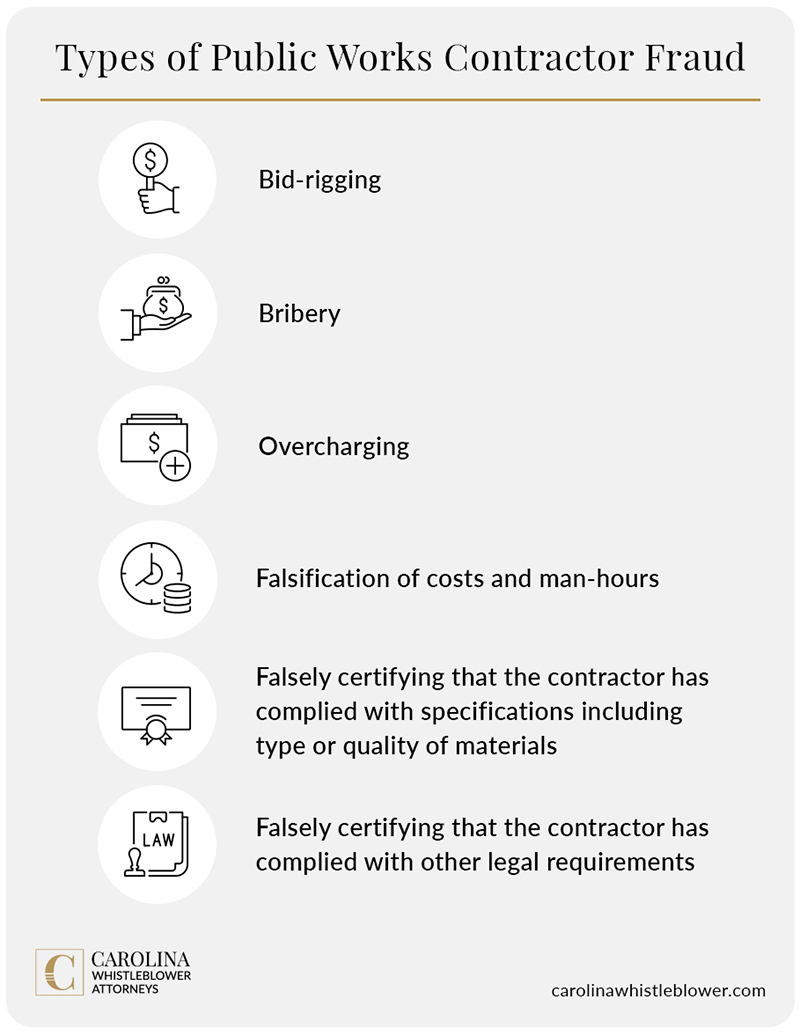Public Works Fraud Whistleblowers
Whistleblowers like you fighting public works fraud for all of us.
Whistleblowers like you fighting public works fraud for all of us.
Public works, or infrastructure, is one of the largest categories of overbilling by state and federal contractors. The federal government is believed to lose tens of millions of dollars to infrastructure fraud every year, with one of the main components being construction fraud.
The federal False Claims Act (FCA) potentially provides large financial incentives to whistleblowers who take appropriate legal action.
State and federal governments spend billions every year to build highways, bridges, railways, airports, and water and sewer facilities. All of these facilities are collectively known as “infrastructure” or “public works” projects. Only a tiny fraction of this is built by government employees; typically, state and federal governments put a project up for bidding by construction companies and award the contract to the company with the bid that is lowest or that incorporates the best mix of value and other favorable aspects, such as diversity of subcontractors.
Appropriations for federal construction projects totaled approximately $161 billion in fiscal year 2020, a 9.3% increase over appropriations for fiscal year 2019. State and local government spending on construction and infrastructure has totaled between $250 and $300 billion in most recent years.
Federal spending on infrastructure is expected to increase in the next decade, with the recent passage of a $1.2 trillion spending package. Of this, $110 billion is dedicated to repair and upgrade of roads, bridges, and other transportation projects, and $39 billion is aimed at public transit projects.
A vast variety of government agencies contract for public works projects. The largest and most obvious are state departments of transportation. The North Carolina Department of Transportation budgeted about $2.3 billion for construction in fiscal year 2020‒21. In 2020, the South Carolina Department of Transportation budgeted $3.2 billion for statewide construction projects.
Many of these agencies’ projects rely heavily on federal funds. Approximately half of transportation construction in North Carolina, for example, is funded by the federal government. Likewise, in South Carolina, federal money is a primary source of funding for public works.
Federal agencies also spend hundreds of billions of dollars each year for their own construction projects. The Army Corps of Engineers, for example, spent more than $2 billion on construction in fiscal year 2019. The State Department spent $777 million on construction and maintenance of U.S. embassies that same year.
When we refer to “public works contractor fraud,” we are referring both to outright fraud and to a wide range of other illegal billing and contracting practices by public works contractors and infrastructure contractors. In some cases, even overbilling practices that are reckless can constitute a violation of the False Claims Act.
Knowingly or recklessly misreporting how federal funds are applied may also be a violation of the FCA. In one FCA case pursued by whistleblower attorneys – including Gary Jackson, now with Carolina Whistleblower Attorneys4 – a construction company entered a $67.7 million contract to build barracks at Camp Lejeune, North Carolina between 2008 and 2012, and a $48.5 million contract for masonry work at Camp Pendleton, California. That contractor won the bids in part because it agreed to subcontract certain portions of the work to small businesses majority-owned by veterans, disabled veterans, women, and economically disadvantaged individuals.
The contractor allegedly reported that it had used subcontractors in those categories even though the vast majority of the work had been completed by a second large business that was in on the alleged scheme. An employee of the second large company filed an FCA lawsuit against the two in July 2012. He and the government settled with one of the companies in May 2016 for an undisclosed sum.1

In January 2021, a Connecticut electrical contractor agreed to pay more than $3.2 million to settle allegations that it committed fraud in connection with public works construction projects. Specifically, the contracts required the contractor to certify that it subcontracted a certain percentage of work to a Disadvantaged Business Enterprise (DBE). The government alleged that the contractor failed to meet those requirements and, instead, terminated its own employees and had them perform work on behalf of the DBE.3
In September 2020, Bechtel and AECOM, two large public works contractors, agreed to pay $57,750,000 to resolve allegations that they overbilled the Department of Energy for the operation of a nuclear and chemical waste processing facility in southeastern Washington. Four employees of the plant sued the companies on behalf of the government in May 2017. The government eventually intervened in the case, and the employees received a total of $13,750,000 for their efforts.1,3 In this instance, the employees’ and the government’s allegations included accusations that the contractors knowingly billed the DOE for employees’ idle time, in violation of contractual terms.
Read More: Set-aside contract fraud
In one South Carolina case, two construction firms agreed to a $400,000 settlement after allegedly submitting false claims to the Department of Transportation. The alleged false claims included assertions that demolition and construction work was completed by a Disadvantaged Business Enterprise, a category of contractor designed to provide women and minority contractors with fair opportunities. “This settlement is yet another in a long string of successes,” said then-U.S. Attorney Bill Nettles — who now leads our whistleblower firm. The whistleblower in this case received an $80,000 reward.1,4
Do you suspect your employer is stealing government funds, but you’re not quite sure which laws they’re violating or how exactly they’re doing it? A lawyer can be your confidential advisor, guide, and supporter as you try to expose these wrongdoers.
Public works whistleblowers perform a vital function in discouraging and policing public works fraud and in helping federal and state governments recover ill-gotten gains. If you are serious about filling this role, there are many ways a whistleblower lawyer can help, and you should consult an attorney with experience in False Claims Act litigation. In addition to fighting fraud, you may be entitled to a significant reward for the risk you took and hard work you put in on the case.
The False Claims Act entitles an infrastructure whistleblower to receive up to 30% of the government’s recovery, but only if the whistleblower meets certain requirements. Many states have similar laws that allow whistleblowers to potentially receive a monetary award after reporting fraud at the state level.
To remain eligible for the potential reward, the infrastructure whistleblower must file the lawsuit as a “relator” on the government’s behalf. The lawsuit must be filed “under seal” – meaning that it cannot be viewed through a search of the federal court system’s database – and the relator must present the lawsuit to the attorneys for the government. The defendant is typically not notified about the lawsuit until the case is unsealed.
As you can see, there is no shortage of fraud against the government among contractors and within the area of public works. While whistleblowers report a tremendous amount of fraud against the government, the vast majority of it still goes undetected.
If you suspect fraud against the government, let’s talk. We are here to help put you at ease as we try to help you determine — confidentially and discreetly — if you should move forward with a whistleblower/qui tam claim. We appreciate the struggle you may be facing. That is why we have a You-First policy in place. We will try to protect you regardless of your involvement.
Experience matters, and ours is deep. We’ve fought for dozens of whistleblowers,4 and we’ve recovered tens of millions of dollars in total settlement since 2016.1 We can provide you with the high-quality representation you deserve. If we decide to take your case and you don’t get a reward for reporting fraud, you owe us no fee.2 Guaranteed. Contact us online or call 1-888-292-8852.
“Bill has the ability to ‘think outside the box’…which makes him extremely effective as an advocate for his clients.” 1 — Attorney who previously worked with Bill





If you’re wondering if it’s a good idea to speak with a whistleblower lawyer about what you know, let us set the record straight.
"*" indicates required fields